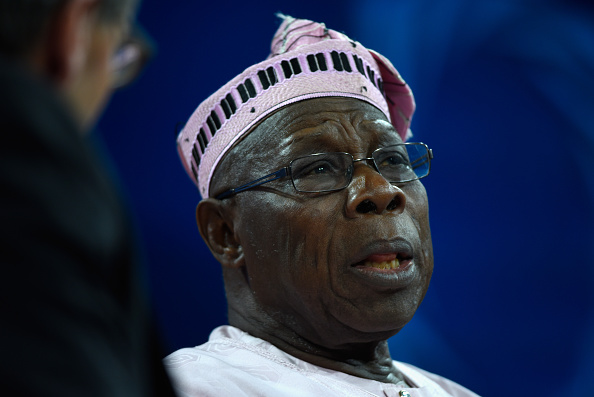Addis Ababa – Top diplomats from the African Union and United States returned to Ethiopia on Thursday as part of a ramped-up effort to broker a ceasefire in the country’s north, the foreign ministry said.
The peace push came amid fears the Tigray People’s Liberation Front (TPLF) and allied rebel groups would advance towards the capital Addis Ababa, and as rights groups decried a fresh round of mass arrests targeting ethnic Tigrayans under emergency measures announced earlier this month.
Olusegun Obasanjo, the AU’s special envoy for the Horn of Africa, and his American counterpart Jeffrey Feltman arrived on Thursday, foreign ministry spokesperson Dina Mufti said at a weekly press conference.
Both men already visited the country earlier this month in a bid to facilitate a deal to end a gruelling year-long war between Prime Minister Abiy Ahmed’s government and the TPLF.
ALSO READ | US, Kenya press for Ethiopia ceasefire
Obasanjo made two trips to Tigray’s capital Mekele to meet TPLF leaders on his earlier trip, a sign of progress after multiple statements in which the TPLF dismissed the AU, which is headquartered in Addis Ababa, as biased in favour of Abiy’s government.
A TPLF source told AFP that Obasanjo may return to Mekele this week.
Dina said Obasanjo “was shuttling between the various forces” as part of “a fact-finding type of mission”.
“I think he’s investigating. He’s talking to different partners. At the end of the day, he will come out with a proposal. That proposal is not yet obvious,” he said.
“The same thing holds true for Mr Feltman,” he added.
Aircraft warning
Fighting broke out in Tigray last November after Abiy, winner of the 2019 Nobel Peace Prize, sent troops there to topple the TPLF, a move he said came in response to TPLF attacks on army camps.
Though he promised a swift victory, by late June the TPLF had retaken most of Tigray including its capital Mekele, and its fighters have since pushed into the neighbouring regions of Amhara and Afar.
Responding to fears of a rebel advance, the US embassy has evacuated non-essential staff and is urging US citizens to leave the country while commercial flights are available.
This week its Federal Aviation Authority advised US carriers to exercise caution while flying into or near Addis Ababa, saying “civil aircraft may be directly or indirectly exposed to ground weapons fire and/or surface-to-air fire”.
US Secretary of State Antony Blinken renewed Washington’s call for a ceasefire during a visit on Wednesday to Kenya, his first stop on his first trip to sub-Saharan Africa since becoming President Joe Biden’s top diplomat.
ALSO READ | US nationals in Ethiopia warned: no Afghan-style evacuation
Last week Dina said any “peaceful solution” would require the TPLF’s withdrawal from Amhara and Afar, something the TPLF has dismissed as “an absolute non-starter” as a condition for talks.
The TPLF, meanwhile, has called on Abiy’s government to break what it describes as a humanitarian “siege” of Tigray, where the UN estimates hundreds of thousands of people are living in famine-like conditions.
AFP reported this week that nearly 200 young children had died of starvation in 14 hospitals in the region, citing data collected by local doctors and researchers between late June and late October.
Foreign Minister Demeke Mekonnen told Feltman on Thursday the government had approved the entry of 369 aid trucks into Tigray, as well as humanitarian flights to Kombolcha and Lalibela, towns in Amhara that are reportedly under TPLF control, according to a government statement posted on Twitter.
No trucks had moved into Tigray via Semera, the Afar capital, by midday Thursday, according to humanitarian officials, and it was unclear when they would.
Arbitrary arrests
Also on Thursday, lawmakers announced a new committee to investigate mass arrests carried out under the new wartime state of emergency.
Arbitrary arrests of ethnic Tigrayans have been widespread during the war, but they have surged under the emergency measures, which the government defends as necessary to stamp out the TPLF.
ALSO READ | Ethiopia’s spiralling war tests fragile region’s stability
The state-affiliated Ethiopian Human Rights Commission (EHRC) estimated Wednesday that thousands of detainees were held in Addis Ababa alone and said it had been denied access to many of them.
The parliamentary committee will start site visits Friday to investigate whether ethnic profiling is taking place, its chairman Lemma Tessema told a press conference.
“We will identify if currently the security apparatus is implementing the state of emergency by targeting people based on their ethnicity or based on… crimes committed,” Lemma said.
Follow African Insider on Facebook, Twitter and Instagram
Source: AFP
Picture: Getty Images
For more African news, visit Africaninsider.com


